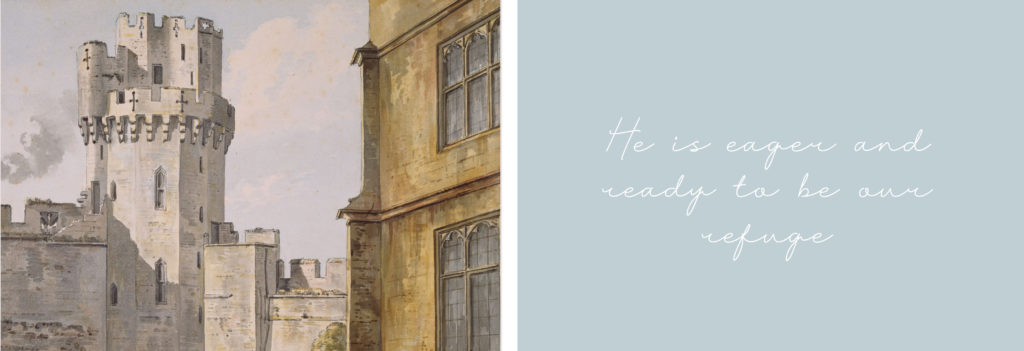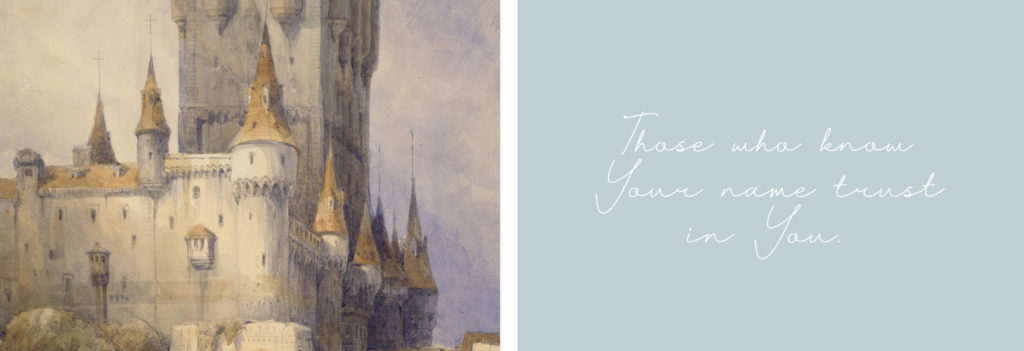Living in the Shadow of the Almighty
by LESLIE LUDY

Lord Craven was a wealthy, respected Christian who lived in London in 1665 when the bubonic plague invaded the city. The disease spread like wildfire, and thousands died each day. As the plague escalated, the wealthy and influential — including most doctors, lawyers, clergymen, and government officials — fled the city for protection. Businesses closed. All trade with London stopped. Meanwhile, those who could not afford to leave were left to fend for themselves among the sick and dying. Many died in terrible circumstances — if not from the plague, then from starvation or dehydration because of the lack of proper food, shelter, and medical care.
Lord Craven, too, was preparing to leave the perils of London for his home in the country. But at the last moment, something changed his mind. Charles Spurgeon recounted the story in his book, The Treasury of David:
His Lordship, to avoid the danger, resolved to go to his seat in the country. His coach and six were accordingly at the door, his baggage put up, and all things in readiness for the journey. As he was walking through his hall with his hat on, his cane under his arm, and putting on his gloves, in order to step into his carriage, he overheard one of his servants say to another, “I suppose, by my Lord’s quitting London to avoid the plague, that his God lives in the country, and not in town.” The speech struck Lord Craven very sensibly, and made him pause. “My God,” thought he, “lives everywhere, and can preserve me in town as well as in the country. I will even stay where I am. My servant has just now preached to me a very useful sermon. Lord, pardon this unbelief, and that distrust of thy providence, which made me think of running from thy hand.” He immediately ordered his horses to be taken from the coach, and the baggage to be taken in. He continued in London, was remarkably useful among his sick neighbors, and never caught the infection.
Instead of self-protection, Lord Craven chose to rest under the shadow of the Almighty and make God his refuge. It was a baffling decision that went against all human wisdom. Between 1665 and 1666, approximately 100,000 Londoners died from the plague (equating to one in every five people in the city). Death was all around him, but he was not touched, even as he helped the sick and dying. The promise of Psalm 91 became his reality: “A thousand may fall at your side, ten thousand at your right hand, but it shall not come near you” (v. 7). Lord Craven staked his very life upon this promise — and God backed him up.
William Bridge, a Puritan minister in the1600s, wrote: “When other men run one this way, another that way, to their hiding places: in the time of a plague, for a man then to [make] God his habitation — I think this is the faith here spoken of in the 91st Psalm.”
Lord Craven proved that when others panic and self-protect, we as Christians can take an entirely different approach. We can choose to make God our refuge. According to human reasoning, this is a foolish way to live. But in God’s heavenly pattern, it is the highest form of wisdom.
Charles Spurgeon wrote, “A German physician was wont to speak of the 91st Psalm as the best preservative in times of cholera. And in truth, it is a heavenly medicine against plague and pest. He who can live in its spirit will be fearless.”

My great-grandmother put this principle into practice. As a farmer’s wife and the mother of seven children, she lived in a rural part of Texas during the Great Depression. On a regular basis, she would visit and help those in her community who were ill with contagious diseases like tuberculosis and influenza. Often these people had no money for medical care. She nursed them, brought food to them, cared for their children, and even delivered their babies. In spite of the fact that she was constantly exposed to contagious illnesses, she remained healthy and never passed sickness along to her large family. What was her secret? She said that she simply washed her hands with lye soap … and prayed. As she put serving others over self-protection, the promise of Psalm 91 became her reality. “You shall not be afraid … of the pestilence that walks in darkness, nor of the destruction that lays waste at noonday” (vs. 5–6).
In a time when fear and self-preservation have a death-grip on the world, it is incredibly refreshing to remember the power and protection of our God that is available to us as His children. In 2 Chronicles 16:9 we are told that, “…the eyes of the Lord run to and fro throughout the whole earth, to show Himself strong on behalf of those whose heart is loyal to Him…” He is eager and ready to be our refuge. Are we willing to let Him?
Some of the women I most admire in Christian history have amazing testimonies about God’s supernatural “Psalm 91” protection over their lives.
Corrie ten Boom told about a night during the war when she couldn’t sleep because of the sound of bombs exploding in her city. Restless and unsettled, she got up from her bed and went down to the kitchen to make herself a cup of tea. Her sister Betsie was already there, drinking her own cup of tea and reading her Bible. They prayed together for God’s peace and protection. Some time later when Corrie went back to her bedroom she saw that her window was shattered and that bomb shrapnel had badly ripped into her pillow, just where her head would have been. Later she told her sister, “If I hadn’t gotten up from my bed, I surely would have been killed.” And Betsie replied, “There are no ‘ifs’ in God’s kingdom, Corrie.”4 “You will not fear the terror by night, nor the arrow that flies by day” (Ps. 91:5 ESV).
Darlene Deibler — an American missionary to Indonesia during the Second World War — was placed under strict house arrest with three other missionaries when the Japanese took over the country. With no weapons, very little food, and no authorities to look to for help, the missionaries were vulnerable to the many local bandits who roamed the area. One night a bandit, dressed in black from head to toe and brandishing a long knife, broke into their house. Darlene managed to scare him away, but was sure that other bandits would soon be back, since they now knew it had very little security or protection. But surprisingly, they never returned.
After the war Darlene was able to find the man who had broken into their home and asked him why he and his fellow robbers never came back again. He looked at her in surprise. “We did come back,” he said, “but you had all those huge people in white standing all around the house. We weren’t about to try to break in once we saw them.” “For He shall give His angels charge over you, to keep you in all your ways” (Ps. 91:11).
Gladys Aylward witnessed God’s protection in a powerful way when she was on her way to China to be a missionary. As she made her way across Russia on the Tran-Siberian Railway, she was taken prisoner by communists, her passport was confiscated, and she was confined to a dirty hotel room with no way of escape. Late at night, a burly Russian man tried to force his way into her room. When she told him to leave, he only sneered at her and said, “I am the owner of this hotel, I can do with you what I wish.” She replied firmly, “No you cannot. You may not believe in my God, but He is here. Between you and me God has placed a barrier. Now go!” The man blinked at her in confusion, then turned and stumbled back down the hallway. Later that same night, through a series of miracles, Gladys narrowly escaped from Russia on a Japanese ship. God had not forsaken her even for a moment. “Because you have made the Lord … your dwelling place, no evil shall befall you…” (Ps. 91:9–10).
Lillian Trasher, an American missionary who started the first Christian orphanage in Egypt, was caring for over 600 orphans when a terrible cholera epidemic swept over the country, claiming the lives of tens of thousands. The disease spread so quickly that its victims could feel fine in the morning and be dead that evening. Having any kind of contact with a person who was ill with the sickness was an almost-certain death sentence. When the children in her orphanage were all exposed to a visiting child who, hours later died from a sudden onset of cholera, she went to her bedroom and read Psalm 91. “I will take those words as a promise, Lord,” she prayed. “And I ask that not one child or worker in this orphanage would be touched by this plague.”
Against the laws of nature, her prayer was answered. Despite the fact that the cholera outbreak was extremely contagious, not one child or worker who had been exposed became ill. Though people all around her orphanage were dying every day, the hundreds of young lives under her care were never touched by cholera. “Nor shall any plague come near your dwelling” (Ps. 91:10).

Psalm 5:11 says, “But let all who take refuge in You rejoice; let them ever sing for joy, and spread Your protection over them, that those who love Your name may exult in You” (ESV).
I love the imagery of God spreading His protection over us like a comforting, protecting blanket. The promises of Psalm 5, Psalm 18, Psalm 61, Psalm 91, and so many other scriptures make it abundantly clear that God is willing and ready to be our shield, protector, fortress, deliver, and strong tower.
How many of us are taking Him at His Word?
If you and I were in Lord Craven’s position — surrounded on every side by a rampant and terrible disease — would we make the choice to stay or to flee? If we were in my great-grandmother’s shoes with seven children during the Great Depression, would we risk our own health to help the weak around us?
These are questions that have deeply challenged me. I am not a naturally bold or courageous person, and I have learned firsthand that living in the shadow of the Almighty is only possible by the enabling strength of God. It doesn’t happen by accident, but by purposefully cultivating a mighty faith in our mighty God.
If you are ready to exchange fear and self-preservation for an unshakable confidence in God’s protection, I’d like to give you three key principles that help me put the promise of Psalm 91 into practice in my life.
ONE: Ask for His Enabling Grace
God’s grace is the supernatural strength to do what is impossible in our own strength — such as choosing faith over fear. In our own human nature, we are wired toward self-preservation and cowardice. We are prone to shrink back from danger instead of facing it boldly. Making God our refuge requires faith that we simply do not possess within ourselves. But the good news is that He is ready to infuse us with His enabling grace. All we must do is ask. Next time you feel weak and cowardly, remind yourself “I can’t — but He can,” and cry out for His enabling grace. Scripture reminds us that He gives “grace upon grace” (Jn. 1:16) meaning that His enabling grace never runs out of its supply.
There may be times when God asks us to flee from danger, like the time when Joseph was warned in a dream to leave in the middle of the night for Egypt with Mary and baby Jesus in order to escape Herod’s violence. (See Matthew 2:13.) But, if and when we retreat, it should not be because of fear, but obedience. And when we are called to stay and face danger boldly, God can equip us with every bit of grace we need. We are never safer than when we are in the center of His will.
TWO: Know Who He Is
Psalm 9:10 tells us, “Those who know Your name trust in You, for You, Lord, have never forsaken those who seek You.” If you want to be made strong in faith, study the many names of God mentioned all throughout Scripture. Each one of His names reveals a different aspect of His nature. Our Protector. Our Healer. Our Strength. Our Righteousness. Our Shield. Our Rock. Just to name a few! When we truly know who He is — and all that He desires to be in our lives — we begin to trust Him with all our heart. A great place to start is by watching the short film He Is. (This short film can be found at www.ellerslie.com/films.) Or go through an inductive Bible study specifically about the names of God. Whenever I have taken time to study His names and what they mean, my faith is strengthened in a truly life-changing and lasting way.

THREE: Be Made Strong to be Poured Out
Living in the promise of Psalm 91 does not mean a “health, wealth, and prosperity” path in which we live an easy and comfortable life, free from all suffering. Suffering and difficulty are found along the narrow way of the Cross. As Amy Carmichael wrote, “We follow a scarred Savior, shall we not have scars?”
But when we make ourselves fully available to God, we can rest in the reality that He will protect and preserve us for His purposes. The enemy cannot hinder us from fulfilling God’s call upon our lives when we choose to make Him our refuge. The promise of Psalm 91 is not for selfish comfort, but so that we can live poured out lives for His glory until He is ready to call us home. Lord Craven was preserved in order to be mightily used by God during one of London’s darkest times. Corrie ten Boom was protected from the shrapnel so that she could become a rescuer of Jewish people during the Holocaust. Gladys Aylward was shielded from the threat of the communists so that she could bring the Gospel to China. And the list goes on and on.
So let’s not take His promises for granted or use them as an excuse to live selfishly. Let’s respond to Psalm 91 by becoming willing to spend our lives without reserve for the One who gave everything for us.
. . .
Next time you are surrounded by fearful people, or when fear tries to knock on the door of your own heart, run to the shadow of the Almighty. There is no better place in the world to be. Read Psalm 91 not as impersonal words on a page, but as promises from God directly to you. You will never regret making Him your refuge. There is no rock like our God. He is a shield to all who trust in Him.

